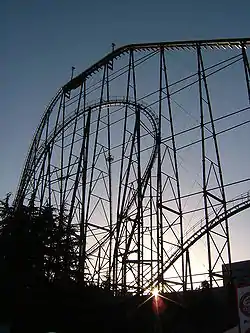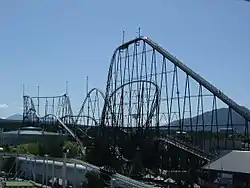Fujiyama (roller coaster)
Fujiyama (富士山) is a steel roller coaster at Fuji-Q Highland, Fujiyoshida, Yamanashi, Japan.[1] When Fujiyama opened in 1996, it was the world's tallest roller coaster at 259 feet (79 m),[2] and had the largest drop in the world at 230 feet (70 m).[3] Fujiyama was also the world's fastest roller coaster for a year of its operation, succeeded by Tower of Terror at Dreamworld theme park in Queensland, Australia, in 1997.[4] Despite being the world's fastest roller coaster in operation for a year, Fujiyama set no world records for roller coaster speed. Steel Phantom at Kennywood set the world record for speed before engineers added additional brakes to slow the ride down because of safety and rider comfort concerns.[5][6]
| Fujiyama | |
|---|---|
 The Fujiyama roller coaster at Fuji-Q Highland amusement park, Japan. | |
| Fuji-Q Highland | |
| Location | Fuji-Q Highland |
| Coordinates | 35°29′09″N 138°46′37″E |
| Status | Operating |
| Opening date | July 1996 |
| Cost | $40,000,000 |
| General statistics | |
| Type | Steel |
| Manufacturer | TOGO |
| Designer | Morgan |
| Model | Hypercoaster |
| Track layout | Out and Back |
| Lift/launch system | Chain |
| Height | 259 ft (79 m) |
| Drop | 230 ft (70 m) |
| Length | 6,709 ft (2,045 m) |
| Speed | 81 mph (130 km/h) |
| Inversions | 0 |
| Duration | 3:36 |
| Max vertical angle | 65° |
| Capacity | 1,100 riders per hour |
| G-force | 3.5 |
| Height restriction | 43.3 in (110 cm) |
| Fujiyama at RCDB Pictures of Fujiyama at RCDB | |
Name
Fujiyama is named after the iconic Mount Fuji, which stands to the west of Tokyo. The term Fujiyama comes from "fuji", and "yama" which means mountain.[1] Mount Fuji is seldom referred to as "Fujiyama" in Japanese culture, but is instead more commonly referred to as "Fujisan", using the on'yomi pronunciation of the "mountain" character. The roller coaster Fujiyama is named as a play on the common foreign mistransliteration.[7]
Design
As with many Japanese roller coasters, Fujiyama has a maximum rider age (~64 years old) and a (if an unlimited ride ticket has not been purchased) separate entrance fee (2,000 yen) in addition to the height restrictions typical of any roller coaster.[8] The layout of Fujiyama is that of a typical out-and-back roller coaster.[1] It incorporates many of the elements that are typical of this coaster design, including a large first drop, "headchopper" elements and a series of small "bunny hills" near the end of the coaster's course.[5]
Reception

Given its record-breaking status, Fujiyama attracted considerable attention when it was built. The ride has been rated positively by some reviewers, garnering 5 stars in Steven Urbanowicz's The Roller Coaster Lover's Companion.[9] Fujiyama did not, however, achieve a listing amongst the top 50 steel roller coaster in Amusement Today's 2009 Golden Ticket Awards.[10]
In medical literature
Fujiyama inadvertently attracted attention in 2000 after an article was published in the journal Neurology.[11][12] The article discussed the possible relationship between riding roller coasters and the occurrence of subdural hematomas. The primary case study cited by the authors was a woman who had reported severe headaches after riding several roller coasters at Fuji-Q Highland, including Fujiyama. Upon investigation, it was discovered that this woman did in fact have a subdural hematoma.[13] Subsequent research, however, has maintained that this risk remains low and is not unique to this particular coaster.[14]
Records
| Preceded by Big One |
World's Tallest Complete Circuit Roller Coaster July 1996 – May 2000 |
Succeeded by Millennium Force |
| Preceded by Moonsault Scramble |
World's Tallest Roller Coaster July 1996 – January 1997 |
Succeeded by Tower of Terror |
| Preceded by Steel Phantom Desperado |
World's Longest Roller Coaster Drop July 1996 – January 1997 | |
| Preceded by Steel Phantom |
World's Fastest Complete-Circuit Roller Coaster July 1996 – February 2000 |
Succeeded by Goliath |
| World's Fastest Roller Coaster July 1996 – January 1997 |
Succeeded by Tower of Terror |
References
- RCDB entry for Fujiyama
- RCDB list of roller coasters by height
- RCDB list of roller coasters by drop
- RCDB list of roller coasters by speed
- Rushin, Steve (9 August 1999). "High rollers". Sports Illustrated.
- Kennywood history page Archived 2010-07-23 at the Wayback Machine
- Tanikawa, Miki (3 April 1998). "A bath with a view: Hot springs and Mount Fuji". The New York Times.
- List of roller coasters at Fuji-Q Highland
- Urbanowicz, Steven J. (2002). The Roller Coaster Lover's Companion: A Thrill Seeker's Guide to the World's Best Coasters. Citadel Press. ISBN 978-0-8065-2309-5.
- 2009 Golden Ticket Award results published by Amusement Today
- Davis, Jeanie Lerche (10 January 2000). "New worries for roller coaster riders". WebMD Health News.
- Nadis, Steve (August 2000). "Dangerous thrills". Popular Science.
- Fukutake, T.; Mine, S.; Yamakami, I.; Yamaura, A.; Hattori, T. (2000). "Roller coaster headache and subdural hematoma". Neurology. 54 (1): 264. doi:10.1212/wnl.54.1.264. PMID 10636168. S2CID 3139741.
- Braksiek, R. J.; Roberts, D. J. (2002). "Amusement park injuries and death" (PDF). Annals of Emergency Medicine. 39 (1): 65–72. doi:10.1067/mem.2002.120127. PMID 11782733. Archived from the original (PDF) on 2011-07-28. Retrieved 2010-07-07.